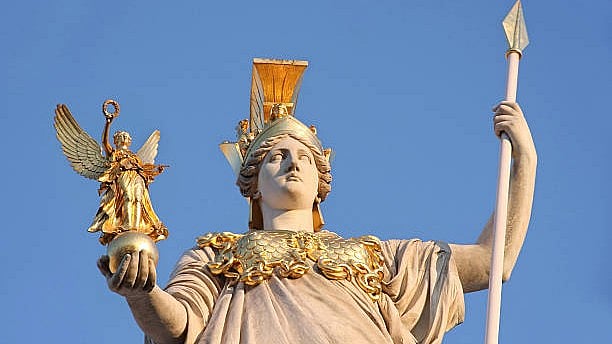
Pallas Athena in front of the Vienna Parliament Pallas Athena in front of the Vienna Parliament.
Credit: iStock Photo
I am famous among the gods for wisdom, cunning wiles, too.
(Homer: Athena in The Odyssey)
I’ve interviewed a considerable number of people in my time — the rich, the famous, the clever, the cunning and the warlike — but this time was different. I was about to interview a goddess! A childhood favourite at that; one who epitomised what I saw myself as someday becoming — ahem — ‘wise’.
There she was. Striding across the plain at the foot of Olympus towards me. No simpering maiden this, but a woman, with her armour and her helmet on and an owl perched at her shoulder. Armour for the goddess of wisdom? Yea, she’s the goddess of war too. I didn’t quite get that but let’s see…
“Thank you so much for meeting with me, my lady,” I stuttered, my mouth dry and showing a distinct tendency to fall open in a gape. She nodded. “So, what did you want to talk about?” “Before we begin,” I said, “Should we call you Athena or Minerva?” “The Greeks called me Athena, so I suppose that is my original name. Later, when the Romans adopted all us gods, they gave us different names, so I became Minerva. I guess you Harry Potter people are more familiar with the latter name.” She grinned as I nodded enthusiastically.
“Do tell us about your birth first,” I said. Always best to start from the beginning. “Zeus, my father, had a terrible headache one day — so awful that he asked Hephaestus, his blacksmith son, to cleave his head open with an axe.” I nodded. (Quite reasonable behaviour as anyone who’s suffered a migraine will tell you. Unfortunately, mortals like me don’t have the luxury of asking someone to break open our heads!) Athena continued, “Hephaestus, did just that and out I came, fully grown and armoured. Hephaestus thought that his part in my birth gave him some sort of ‘right’ over me but I set him right on that one. NO ONE has ‘rights’ over me. I was Zeus’ favourite child and besides being on his council of 12, I hold two very important portfolios — wisdom and war.”
“About that,” I said. “Isn’t that a strange combination? Apart from the fact that there is another god of war, Ares?” Athena snorted. “Ares knows nothing better than to use brute strength and spill a lot of blood. My capabilities are to do with strategy and negotiation. That is a role that requires intelligence and wisdom. Qualities that my dear Odysseus too had. Think about the brilliant strategy of using the hollow horse to get inside Troy. Think of how he outwitted the cyclops and the sirens on his way home to Ithaca. Of all the Greeks he and Diomedes are the ones I loved to help. I don’t like fools!” I gulped and wondered how I fared on her intelligence metric.
“Could you perhaps give us an example of what you mean by a fool?” “That’s easy! How many would you like? Let’s take that time when that boy, Paris, had to choose between Aphrodite, Hera and myself in a sort of idiotic beauty contest. I promised him incomparable wisdom. But what did he choose? The most beautiful woman in the world. Much good did it do him! She brought about the doom of his entire city.”
“And then there was Arachne,” Athena went on. “She went around boasting that she was a better spinner than me! Me, who invented the art of spinning! I am the patron of all craft! I turned her into a spider! She and her children can spin through eternity.”
I shuddered. She was a fearsome goddess, indeed. I needed to ask her a question that would put her in a better mood…
“Please do tell us how you became the patron goddess of Athens.” “Ah, now there we have a set of intelligent people. Poseidon and I both wanted to be the patron God of that city. We had a fairly civilised contest. The Athenians asked us each to offer a gift to the city. Poseidon brought forth a splendid spring of water. But Poseidon’s spring (he being the god of the ocean) had salt water quite unsuitable for drinking. I gifted the Athenians an olive tree which gave them not just food, but also oil and wood. I won, of course!”
“Of course!” I said. “I wish that gorgeous statue of yours in the Parthenon was still there for us to see! Do you wish you had married and had children?” I asked as a final question as my lady rose to leave. “Where’s the time? War and wisdom: isn’t that work enough to do in this world of yours? Anyway, I do have an adopted son and that is ample. May you always keep your wits about you, she blessed me as she left.